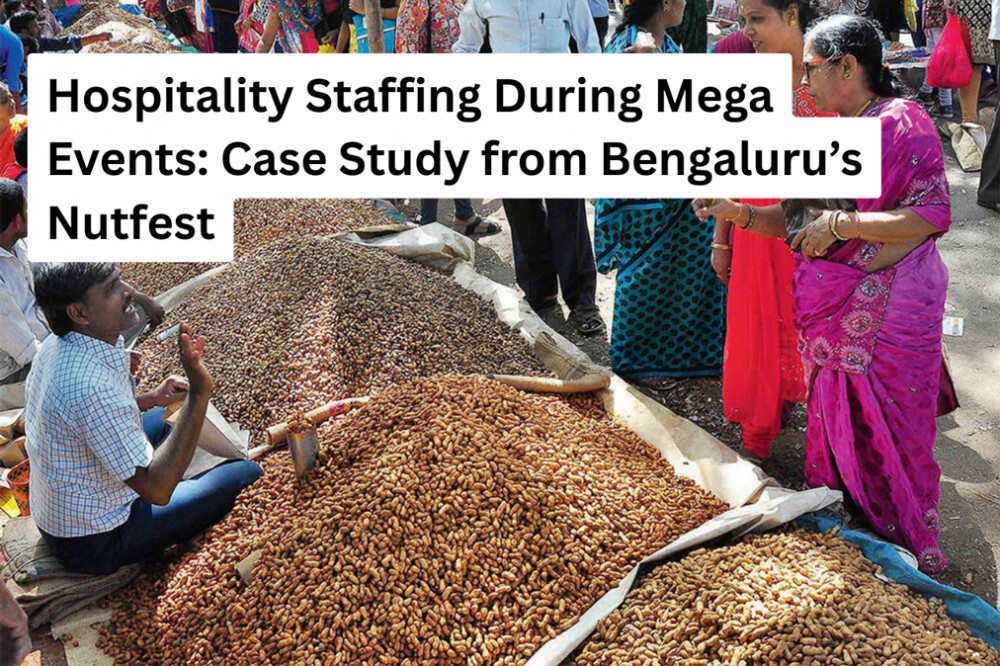
Seasonal and Festival-Based Job Opportunities in Indian Hotels

The hotel sector in India has a clear cycle of activity, with demand rising and falling throughout the year due to a variety of festivals, weddings, pilgrimage seasons, school holidays, business conferences, and regional patterns of travel. For hoteliers, demand creates predictable staffing requirements; for job seekers, it creates frequent opportunities to find meaningful work, short-term income, and pathways into full-time hospitality employment. This article will present some of the major opportunities based on seasonality and festivals, the most common roles recruited for, timing and types of contracts, best practices for employers for recruiting roles, and practical tips for candidates.
The significance of seasonality in Indian hospitality
India’s cultural calendar is packed as it provides a variety of festivals, including Diwali, Eid, Christmas, Navratri, Dussehra, Holi, local harvest festivals, wedding season, and major pilgrimage times, all of which bring increases in tourism activities. When coupled with tourism peaks from summer holiday times, winter holidays, corporate events and one-off financial windfalls (sporting events, expos), hotels are pushed to scale up operations. Seasonal staffing allows hotels to:
- Offer service standards at busy times without long-term, fixed labour costs;
- Allocate flexible payroll to the peak income period.;
- Trial potential full-time staff during busy times.
For workers, seasonal roles are an opportunity to earn income, develop skills (guest handling, event service, kitchen techniques), and develop community networks that could lead to permanent employment.
Common festival and seasonal hiring windows
- Wedding Season (varies by location; typically October through February in many parts of India): Hotels will recruit for the positions of banquet managers, banquet servers, bartenders (where appropriate), sous chefs, managers to handle decorating, and housekeeping department.
- Diwali and Dussehra (October through November): There will be an increase in the requirement for staff in food and beverage roles, front-desk surge cover, concierge, teams managing in-house festive activities, and an increase in housekeeping.
- Occasional spike in travel in winter (November through February): Resorts and luxury hotels will increase the recruitment of culinary staff, spa therapists, activity coordinators, transport and logistics staff.
- Summer holidays with school-age children (for example, May through June): Family travel tends to drive the need for kids' activity employees, recreational executives, lifeguards in the pool (irrespective of the guest velocity), and temporary housekeeping.
- Pilgrimage seasons (for instance, Char Dham, Kumbh, and other regional yatra dates): Budget hotels and mid-segment hotels situated in the vicinity of a pilgrimage place will increase their front office, management of dormitory staff, and security staff.
- Festival periods such as Holi and Navratri (usually during March through October based on the region): there will be short-term hire for event management roles, security, entertainers and DJs, and temporary food and beverage kiosks in facilities where appropriate.
- Religious fasting or feast period (such as Ramadan and Eid): Hotels in urban centres or in pilgrimage centre locations will increase recruitment for banquet and room service as it relates to Iftar and Eid functions.
- Major conferences, conventions, expos and sporting events are also general spikes as they create demand for each of those short-term recruitments, such as event managers, stewards, and kitchen temp staff.
Roles commonly available on a seasonal basis
- Front Office: Receptionists, night auditors, assistant concierge, and reservation agents.
- Food & Beverage: Servers/stewards, bar attendants, banquet captains, commis cooks, pastry assistants.
- Housekeeping & Laundry: Room attendants, public-area cleaners, linen handlers.
- Kitchen & Culinary: Line cooks, prep cooks, dishwashers, and banquet cooks.
- Events & Banquets: Event coordinators, setup crew, audio-visual assistants, and stewarding.
- Recreation & Guest Activities: Lifeguards, kids’ club staff, tour guides, wellness therapists.
- Support functions: Security, maintenance/engineering, transport drivers, temporary purchasing assistants.
Best practices for recruiting and onboarding employees in a hotel setting
- Planning staffing levels based on historical data: Use last year's occupancy or indications of occupancy, booking patterns (i.e. busy days of the week), event calendars, etc., to inform your staffing needs.
- Consider a seasonal pool of talent: Keep a database of trained (and perhaps briefed in previous seasons) past seasonal associates that can quickly be called back when you need personnel.
- Short training modules: Enrol all seasonal associates in brief (but role-specific) training modules (i.e. service etiquette, upselling basics, safety procedures, etc.). It helps to keep onboarding quick, but also maintain service quality.
- Professionalised job brief and schedule anticipated in the offer of employment: Outline overall shifts, hospital hours, dress code expectations, and reporting hours expected in the job offer. Provide different ways in which the employee is in communication with management.
- Fair wages and compensation: Competitive labour rates, transportation or meal allowances, and clear, transparent policies on overtime rates will help manage retention with brief employees.
- Utilise local recruitment channels: Various channels available to recruit talent - staffing departments in hospitality institutes, local placement agencies, community agencies, and millennials and Gen Z "digital job hot spot boards" - can serve as effective means to staff quickly.
- Health & safety protocol: Especially for large events or busy seasons, plan for appropriate medical coverage, a safety emergency plan (if, for example, guests have restricted hours of availability), and reliable health and safety protocols applied to the hours of assigned duty.
- Feedback cycle: Ask past seasonal employees and management a series of questions about their past work experience, and encourage returning staff for the next season or cycle to create a smooth onboarding transition.
Tips for job seekers looking for seasonal hotel roles
- Timing your applications: Hotels may begin hiring for peak season positions 4-8 weeks ahead of the peak season. They may typically hire early for training and roster planning.
- Promote related, recent job experience: Banquet service and guest-facing frontline F&B, or even volunteer event position experience, are experiences that you can highlight and use to promote skills of speed, flexibility and customer service as it applies to the type of job you are applying for.
- How flexible are you with your work shift? Peak/high volume seasons may require night shift work as well as weekend work, and the more flexible you are with that possibility, the more probable it is that you will find work and be hired.
- Upskill: Take short courses and certifications in food safety (basic FSSAI services) or even basic barista training/certifications or a hospitality customer service course.
- Network in person locally: Call the hotels, attend job fairs focused on hospitality by hospitality schools or update your profiles on local job boards and platforms.
- Inquire about career paths: A large number of seasonal hotel positions lead to permanent employment (assuming you do well over the season). Ask in the interview about the potential conversion policy.
Obstacles and their solutions
- High turnover and uneven quality: Solution: quick-training tools that have been standardised with mentoring by a core group and an incentive-based pay schedule tied to the quality of the work performed.
- Legal and compliance issues: Solution: seek advice from HR/legal on virtual terms, wage requirements, and any social security obligations associated with temporary work.
- Logistics for larger events: Solutions: solid, predictable scheduling software; contingency plans for staffing; and a reliable plan for vendor management if needing to outsource.
Final recommendations
For hotels: be prepared, spend on accelerated training, have a seasonal repository of talent, and be willing to sign fair and transparent contracts that duly address the needs of the business as well as the rights of the worker. For job seekers: know the hiring windows, explain what you’ve done that’s relevant, be flexible, and utilise short certifications to pique employers’ interest.
Seasonal and festival-based hiring is not merely a way to bridge a gap; when approached strategically, it can help define operational resilience and build goodwill in the community and an ongoing, reliable, seasonal workforce. For hotels in India — a calendar year defined by festivals and gatherings of people — getting seasonal staffing right is critical to joyfully enhancing hospitality and ensuring business continuity.
Join Foodism Connect, India’s unique platform for hospitality professionals and students. Find job opportunities, internships, and training opportunities designed for the fast-paced food and hospitality industry.
Related Blogs

The Rise of Boutique Hotels: Recruiting for Experience, Not Size
73 Views

Top 5 Hospitality Roles Most in Demand This Quarter
71 Views

Hospitality Staffing During Mega Events: Case Study from Bengaluru’s Nutfest
86 Views

Festival Hospitality: What Food Events Teach About Guest Management & Staffing
194 Views

Little Guests, Big Smiles: How Hotels Design Family-Friendly Experiences
171 Views